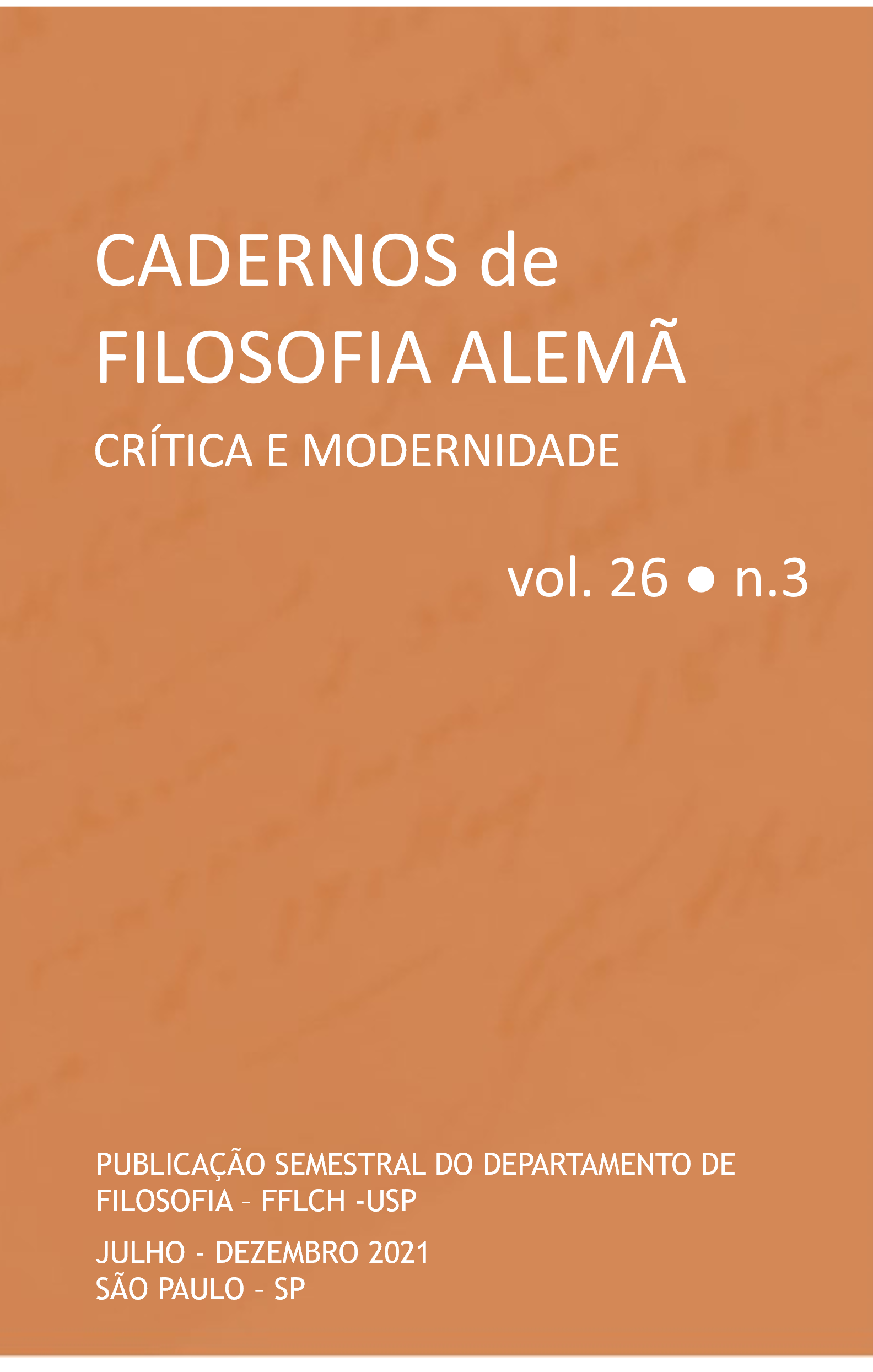Transgression and utopia: Faust in Ernst Bloch’s aesthetics
DOI:
https://doi.org/10.11606/issn.2318-9800.v26i3p75-92Keywords:
Transgression, Faust, Concrete utopiaAbstract
The purpose of this article is to present transgression as a fundamental dialectical category in Ernst Bloch’s philosophy. For this, we start from Bloch’s original interpretation of Goethe’s Faust. The relationship established between Philosophy and Literature in Faust’s analyzes reveals that the conceptualization of Fausto as a model figure of transgression is the cornerstone, in literature, capable of moving an aesthetic reflection about the utopian potentialities of art.
Downloads
References
Baptista, D. Oliveira, M. H. (2014). T. e comentário:. [Gotthold Ephraim Lessing:] “Décima sétima carta”;, das Cartas sobre a literatura mais recente (Fevereiro de 1759). O Percevejo Online, 5 (2), 55-74. DOI: https://doi.org/10.9789/21767017.2013.v5i2.%25p.
Benjamin, W. (2009). Ensaios reunidos: escritos sobre Goethe. Tradução de Mônica Krausz Bornebusch, Irene Aron e Sidney Camargo. São Paulo: Duas Cidades; Editora 34.
Berman, M. (1986). Tudo que é sólido desmancha no ar: a aventura da modenidade. São Paulo: Companhia das Letras.
Bloch, E. (1964). Geist der Utopie: zweiten Fassung von 1923. Frankfurt am Main: Suhrkamp Verlag.
Bloch, E. (2005). O princípio esperança. Vol. I. Trad. Nélio Schneider. Rio de Janeiro: EDUERJ: Contraponto.
Bloch, E. (2006). O princípio esperança. Vol. III. Trad. Nélio Schneider. Rio de Janeiro: EDUERJ: Contraponto.
Contreras, J. M. (2004). Las huellas de lo oscuro: Estética y Filosofía en Ernst Bloch. Salamanca: S. Esteban.
JAMESON, Fredric. Marxismo e forma: teorias dialéticas da literatura no século XX. Tradução de Iumna Maria Simon e Ismail Xavier Fernando Oliboni. São Paulo: Editora HUCITEC, 1985, p. 111
Gadamer, H-G. (1998). Filosofia e Literatura (1981). In: Hermenêutica da Obra de Arte. Tradução Flávio Paulo Meurer. 2. ed. Petrópolis: Editora Vozes.
Galle, H. (2004) Resenha: Goethe, Johann Wolfgang von: Fausto. Uma tragédia. Segunda parte. Tradução do original alemão de Jenny Klabin Segall. Apresentação, comentários e notas de Marcus Vinícius Mazzari. Ilustrações de Eugène Delacroix. Edição bilíngüe. São Paulo: Editora 34, 2007. Pandaemonium germanicum, 8/2004, 229-233. DOI: https://doi.org/10.11606/1982-8837.pg.2004.68428
Goethe, J. W. von. (2004). Fausto. Uma tragédia. Primeira parte. Tradução do original alemão de Jenny Klabin Segall. Apresentação, comentários e notas de Marcus Vinícius Mazzari. Ilustrações de Eugène Delacroix. Edição bilíngue. São Paulo: Editora 34.
Goethe, J. W. von. (2007). Fausto. Uma tragédia. Segunda parte. Tradução do original alemão de Jenny Klabin Segall. Apresentação, comentários e notas de Marcus Vinícius Mazzari. Ilustrações de Eugène Delacroix. Edição bilíngue. São Paulo: Editora 34.
Lessing, G. E. (1997). “D. Fausto”. In: Werke (1758-1759), Bd 4. Frankfurt am Main: Herausgegeben von Gunter E. GRIMM. DKV.
Lukács, G. (1972). Goethe et son époque. Trad. Francesa de L. Goldmann et Frank. Paris: Nagel.
Marlowe, C. (2018). A Trágica História do Doutor Fausto e a História do Doutor João Fausto de 1587: O nascimento de uma tradição literária. Tradutor: Luís Bueno, Caetano W. Galindo e Mario Luiz Frungillo. Cotia-SP: Ateliê Editorial; Campinas, SP: Editora da Unicamp.
Mazzari, M. V. (2019). A dupla noite das tílias: História e natureza no Fausto de Goethe. São Paulo: Editora 34.
Rodrigues, U. M. (Org.). (2019). Escritos sobre o Espírito da utopia de Ernst Bloch.
Porto Alegre, RS: Editora Fi. 284p. Disponível em: https://www.editorafi. org/628bloch. [acesso: 30.11.2021]
Downloads
Published
Issue
Section
License
Copyright (c) 2021 Ubiratane de Morais Rodrigues

This work is licensed under a Creative Commons Attribution-NoDerivatives 4.0 International License.
Information and conceptions on the texts are complete responsibility of the authors.
All the articles submitted before July 5th 2018 and those published after July 2021 are licensed under a CC BY-NC-ND license – except those published between the aforementioned dates, which are under the CC BY-NC-SA license. The permission for the translation of the material published under the license CC BY-NC-ND by third parts can be obtained with the consent of the author.
Open access policies - Diadorim
Rules applied before July 5th 2018:
Presenting a submission to our Editorial Board implies granting priority of publication for “Cadernos de filosofia alemã”, as well as transferring the copyright of texts (once published), which will be reproduced only with the manifest authorization of the editors. Authors keep the right to reuse the texts published in future editions of their work, without paying any fees to "Cadernos”. We will not grant the permission to re-edit or translate the texts for third parts without agreement of the author.


